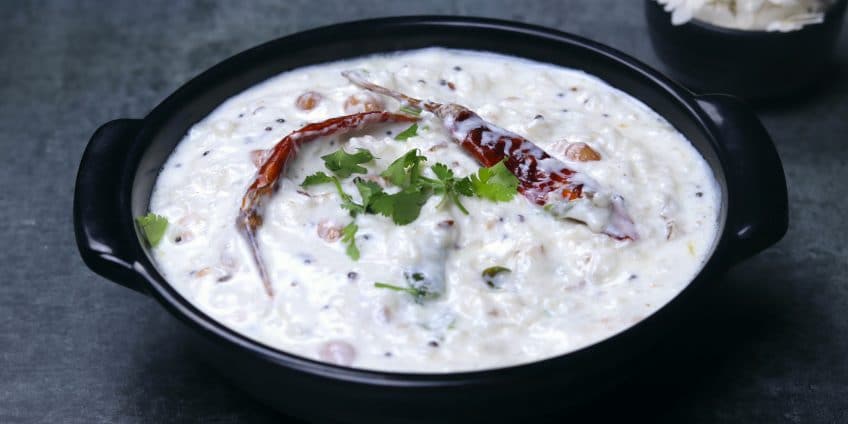Scroll to Recipes with Curd / दही as ingredient
Curd is one of the most utilised dairy products and is categorised as a type of cheese. However, in India, we do not use it like one. One usually acquires curd by a curdling process using an acidic substance like lemon, vinegar, or even curd itself in milk. The acidic content in milk causes it to solidify in lumps or masses and also turning it sour. It is the first step in cheesemaking.
There are different types of curd products like cottage cheese, curd cheese, farmer cheese, pot cheese, Queso Blanco, and paneer.
In India, we use it mostly as an accompaniment. However, in Western regions, it is a part of baking desserts like puddings and tarts.
Commonly Known As
| Language | Name | Written as |
|---|---|---|
| Arabic | takhathar | تخثر |
| Bengali | Doi | দই |
| Gujarati | Dahīṁ | દહીં |
| Hindi | dahee | दही |
| Kannada | Mosaru | ಮೊಸರು |
| Malayalam | tair | തൈര് |
| Marathi | Dahī | दही |
| Punjabi | Dahīṁ | ਦਹੀਂ |
| Tamil | Tayir | தயிர் |
| Telugu | Perugu | పెరుగు |
| Urdu | dahee | دہی |
Nutritional Profile of Curd
Nutritional profile per 100 gms
- Calories: 98
- Protein: 11g
- Carbohydrate: 3.4g
- Fat: 4.3g
- Cholesterol: 17mg
- Sodium: 364mg
- Potassium: 104mg
Source: USDA & Google
Benefits Of Curd
Good For Digestion
Curd is excellent for the people who suffer from indigestion. It can maintain the balance of the acid levels in the body. Therefore, it helps in the digestion of other foods. So, one will feel relaxed and light stomach once they consume more amount of this.
Beneficial For Weight Loss
Curd contains more amount of calcium. Calcium helps in fighting cortisol- a hormone whose imbalance is responsible for increasing blood sugar and weight loss in our body. Calcium prevents the more than needed creation of this hormone and thus preventing weight increase.
Bone Strength
Calcium is excellent and most important for the strength of our bones. Curd has an ample amount of calcium and phosphorous as well. Both of these helps to strengthen our bones. So it is helpful for our bones and teeth strength. Regular consumption of this food can result in the prevention of problems like arthritis and osteoporosis.
Health Of Heart
The inclusion of curd in your daily diet is also good for the heart. Consuming it will lessen the cholesterol level in your body. That itself can reduce the extra stress on the heart. It also keeps the arteries clean so the blood flow will be smooth. Thus, by this, the risk of heart-related disease will be less.
Good For Immune System
Curd contains several micro-organisms that are necessary for our body. It makes one of the best probiotic food. The component present in it provides strength and power to the metabolism, regulating it and increases our body’s immune system and helps us stay healthy.
Good For Lactose Intolerant People
Lactose intolerant people generally cannot consume milk and products containing milk. So they are devoid of the nutrition that milk provides to the body. Lactose intolerant people can get the milk nutrients from curd instead. It is the best alternative to milk and also provides the same benefits as milk.
Improves Mental Health
Curd can provide relaxation and emotional balance, as per some research. It results in a reduction of mental problems like stress and anxiety. Thus, this makes it an excellent remedy for maintaining mental health.
Side Effects
Though curd is relatively okay to consume, side effects may arise when one consumes more daily. It can result in a problem like constipation. Consuming it too much may enable acid collection in your joints or muscles as well. So it will be better if the people who have arthritis and joint pains do not eat it in large quantities.
Frequently Asked Questions
Are yogurt and curd the same?
No, they are not the same. Curd is obtained from solidifying milk into lumps using lemon, vinegar, or curd as well. Yogurt, however, is obtained from fermenting milk by bacteria. The texture of both also differs.
What are the uses of curd?
Curd is an accompaniment in Indian cuisines, such as in salads. However, sometimes it is part of the main dish as well. Other than this is also used in cakes, cupcakes, bread, muffins, pancakes, waffles, cream puffs, tarts, and cookies as toppings in western cuisine. It is also the lemony filling found in lemon meringue pies.
Which food one should avoid with curd?
Fish, fried foods, and sour fruits should be avoided with curd. Most of the time, there is a chance of getting indigestion, acidity, or stomach problems by having these combinations.

